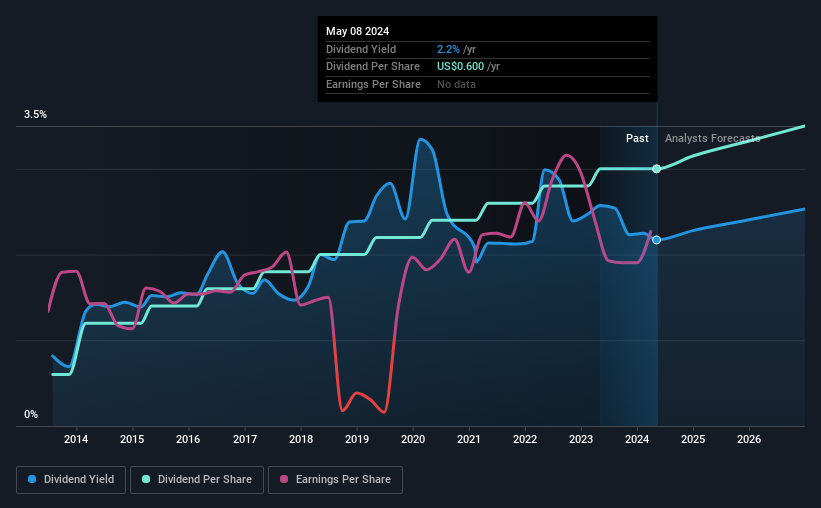- United States
- /
- Insurance
- /
- NYSE:CNO
CNO Financial Group's (NYSE:CNO) Dividend Will Be Increased To $0.16
CNO Financial Group, Inc. (NYSE:CNO) has announced that it will be increasing its periodic dividend on the 24th of June to $0.16, which will be 6.7% higher than last year's comparable payment amount of $0.15. This makes the dividend yield about the same as the industry average at 2.2%.
View our latest analysis for CNO Financial Group
CNO Financial Group's Earnings Easily Cover The Distributions
We like a dividend to be consistent over the long term, so checking whether it is sustainable is important. However, prior to this announcement, CNO Financial Group's dividend was comfortably covered by both cash flow and earnings. This means that most of what the business earns is being used to help it grow.
Looking forward, earnings per share is forecast to rise by 8.5% over the next year. If the dividend continues on this path, the payout ratio could be 17% by next year, which we think can be pretty sustainable going forward.

CNO Financial Group Has A Solid Track Record
Even over a long history of paying dividends, the company's distributions have been remarkably stable. Since 2014, the annual payment back then was $0.12, compared to the most recent full-year payment of $0.60. This works out to be a compound annual growth rate (CAGR) of approximately 17% a year over that time. We can see that payments have shown some very nice upward momentum without faltering, which provides some reassurance that future payments will also be reliable.
The Dividend Looks Likely To Grow
Investors could be attracted to the stock based on the quality of its payment history. We are encouraged to see that CNO Financial Group has grown earnings per share at 25% per year over the past five years. Earnings per share is growing at a solid clip, and the payout ratio is low which we think is an ideal combination in a dividend stock as the company can quite easily raise the dividend in the future.
CNO Financial Group Looks Like A Great Dividend Stock
Overall, we think this could be an attractive income stock, and it is only getting better by paying a higher dividend this year. Distributions are quite easily covered by earnings, which are also being converted to cash flows. All of these factors considered, we think this has solid potential as a dividend stock.
Companies possessing a stable dividend policy will likely enjoy greater investor interest than those suffering from a more inconsistent approach. Still, investors need to consider a host of other factors, apart from dividend payments, when analysing a company. As an example, we've identified 2 warning signs for CNO Financial Group that you should be aware of before investing. If you are a dividend investor, you might also want to look at our curated list of high yield dividend stocks.
New: AI Stock Screener & Alerts
Our new AI Stock Screener scans the market every day to uncover opportunities.
• Dividend Powerhouses (3%+ Yield)
• Undervalued Small Caps with Insider Buying
• High growth Tech and AI Companies
Or build your own from over 50 metrics.
Have feedback on this article? Concerned about the content? Get in touch with us directly. Alternatively, email editorial-team (at) simplywallst.com.
This article by Simply Wall St is general in nature. We provide commentary based on historical data and analyst forecasts only using an unbiased methodology and our articles are not intended to be financial advice. It does not constitute a recommendation to buy or sell any stock, and does not take account of your objectives, or your financial situation. We aim to bring you long-term focused analysis driven by fundamental data. Note that our analysis may not factor in the latest price-sensitive company announcements or qualitative material. Simply Wall St has no position in any stocks mentioned.
About NYSE:CNO
CNO Financial Group
Through its subsidiaries, develops, markets, and administers health insurance, annuity, individual life insurance, insurance products, and financial services for middle-income pre-retiree and retired Americans in the United States.
Established dividend payer and good value.
Similar Companies
Market Insights
Community Narratives




